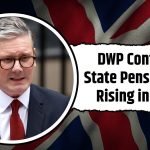When your pocket is already tight and the challenge of budgeting at the end of every month is becoming even more complex, then any help from the government brings a ray of hope. In today’s time, responsibilities like electricity bills, groceries, travel expenses, children’s needs, and care for elderly family members have increased so much that it has become harder than ever for the average UK household to stay afloat.
To ease this pressure, the UK government has announced the Cost of Living Payment for 2025, which aims to support low-income families and individuals already receiving Universal Credit, Pension Credit, or other related means-tested benefits. Managed by the Department for Work and Pensions (DWP), this scheme delivers not just financial aid but also a message of solidarity from the government to those most affected by the rising cost of living.
Three-Part Payment System for 2025 (Spring, Summer, Autumn Installments)
The 2025 Cost of Living Payment has been thoughtfully divided into three phases. Rather than issuing a one-time payment, the government will offer support throughout the year, helping recipients during three critical periods:
- Spring Payment (March–May): A fixed amount of £301 will be paid as the first installment to all eligible individuals.
- Summer Top-Up (July–August): An additional amount of up to £200 will be issued to cover rising summer expenses.
- Autumn Payment (October–December): A final payment, the amount of which may vary based on personal circumstances and available support.
Altogether, eligible recipients could receive up to £500 in 2025. These payments will be deposited automatically into the bank account linked to DWP benefits, meaning no separate application is required.
Who Is Eligible? (Auto-Enrolled Benefit Recipients)
One of the best features of the 2025 Cost of Living Payment is its auto-enrollment system. If you already receive any of the following benefits, you’ll automatically be considered:
- Universal Credit
- Pension Credit
- Income-based Jobseeker’s Allowance (JSA)
- Income-related Employment and Support Allowance (ESA)
- Income Support
There’s no need to apply separately, as the government uses your existing benefit records to determine eligibility. The goal is to make sure that no qualifying person is left out.
However, beneficiaries are strongly advised to ensure that their information is current. If you’ve recently had a change in income, switched bank accounts, or moved to a new address, update these details on the Universal Credit portal or via your DWP account. Failure to do so could result in delayed or missed payments.
Extra Payments for Disabled Individuals, Carers, and High-Need Households
While the standard payment can go up to £500 annually, additional support is available for those with special circumstances.
- Disabled individuals receiving disability-related benefits will be entitled to an extra £150 to £200, helping them manage costs related to healthcare, mobility, and support equipment.
- Carers, who provide essential care for elderly or disabled individuals, may receive up to £500 in additional help. Their role often limits their ability to earn a full income, making this support especially valuable.
- High-need households using medical equipment like oxygen machines, electric beds, or ventilators often face inflated electricity bills. Additional energy support is being allocated to ensure that these homes do not face disconnection or hardship.
These targeted provisions make the Cost of Living Payment more inclusive and responsive to people in varied life situations.
Payment Process and What You Need to Do
Although the system is designed to be fully automated, recipients should still take a few steps to ensure timely and accurate payments:
- Verify your eligibility: Make sure you are still actively receiving one of the qualifying benefits.
- Update your account details: If you’ve changed your bank account or address, update your records via the Universal Credit portal or contact DWP directly.
- Track updates regularly: Check the DWP website, news portals, or your benefit account for announcements regarding exact payment dates and status.
- Contact DWP if needed: If you haven’t received your payment by the expected time, double-check your details. If everything is correct and the payment is still missing, reach out to DWP.
Remember: payments may take a few days to process, so don’t panic immediately. Keep your information updated, and monitor your account regularly.
Don’t Miss Out on Other Schemes: Additional UK Government Support in 2025
The Cost of Living Payment is just one of many support schemes available in 2025. Several other relief programs are running alongside to form a comprehensive safety net:
1. Warm Home Discount
This scheme offers up to £150 off electricity bills during the winter months. Pensioners and low-income households benefit the most from this automatic discount.
2. Household Support Fund
Run by local councils, this fund provides emergency support in the form of:
- Cash grants
- Food vouchers
- Essential winter items (like warm clothes and blankets)
It’s particularly useful for families not eligible for other mainstream benefits.
3. Winter Fuel Payment
Aimed mainly at pensioners, this scheme offers additional financial support to heat homes during colder months. It typically ranges from £100 to £300, depending on age and circumstances.
By combining these schemes with the Cost of Living Payment, the government aims to provide year-round assistance to vulnerable households and help them live a stable, dignified life.
Why This Payment Matters: A Lifeline During Financial Strain
For many households, this payment is more than just financial help—it’s a lifeline. With energy prices fluctuating, food costs rising, and day-to-day expenses growing, even a few hundred pounds can ease the burden and help families stay afloat.
What makes the scheme stand out is:
- No application required
- Targeted support for high-need groups
- Multiple payments spread throughout the year
- Integrated with other major government aid schemes
It also signals a deeper message from the government: that it acknowledges the struggles of ordinary citizens and is ready to step in and help.
What Should You Do Now? (Final Checklist)
If you believe you’re eligible for the Cost of Living Payment 2025, here’s what you should do right now:
- Log into your Universal Credit or DWP account to ensure your benefit status is active
- Confirm your bank account and address details are correct
- Monitor the DWP website for exact payment dates
- Apply for other local schemes if you face additional difficulties (e.g. Warm Home Discount, Household Support Fund)
- Share this information with anyone who may benefit but is unaware
The right information at the right time can not only secure your own relief but may help others around you who are silently struggling.
Conclusion: More Than Money—It’s a Statement of Support
The Cost of Living Payment for 2025 isn’t just a financial program. It’s a statement from the government that no one should face hardship alone. It proves that policies, when executed correctly, can make a real difference in people’s lives.
If you’re eligible, take this as an opportunity to stabilize your finances, support your family, and feel confident that you are not alone. And if you’re not a beneficiary yourself, share this knowledge—it might be life-changing for someone else.
FAQs
Q1. How much will I receive from the 2025 Cost of Living Payments?
A. You could receive up to £500 in total, split into three installments throughout the year.
Q2. Do I need to apply to get the payment?
A. No, payments are automatic if you’re receiving eligible government benefits.
Q3. What benefits qualify for the payment?
A. Universal Credit, Pension Credit, income-based JSA or ESA, and Income Support are included.
Q4. When will the payments be made?
A. Payments will be issued in Spring (£301), Summer (up to £200), and Autumn 2025 (final amount may vary).
Q5. Can I receive extra support if I’m disabled or a carer?
A. Yes, you may qualify for additional payments of £150 to £500 based on your personal circumstances.


